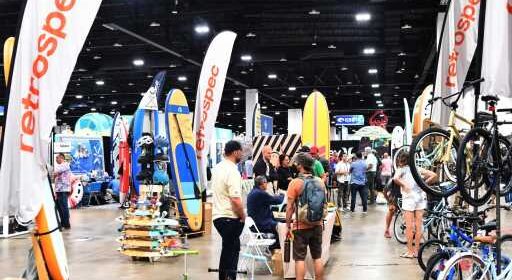Colorado studying an alternative to the Outdoor Retailer show

Denver lost the the tug-of-war over the Outdoor Retailer trade show, which moved back to Salt Lake City this year after a five-year run in the Mile High City.
Emerald Expositions, the organizer of winter and summer trade shows, made the call last year, removing events that generated $40 million to $60 million a year in economic activity prior to the pandemic. But Denver isn’t going to go sulk on the couch, binge-watch Warren Miller videos and whine about what could have been.
Instead, Visit Denver and Outside Inc., a Boulder-based leader in recreational media, are teaming up to study the feasibility of a festival that backers envision as a recreational industry equivalent of the tech-focused South by Southwest Festival in Austin, Texas, which has film and musical festivals attached to a tech confab.
The Outside Festival, or RecFest, or whatever catchy name sponsors finally land on, has the potential to be bigger, better and draw more people than the Outdoor Retailer trade shows, said Samantha Albert, deputy director of the Colorado Outdoor Recreation Industry Office.
Albert said the whole trade show model is shifting. Gear and clothing makers and retailers don’t just want to make business-to-business connections but also want to reach out directly to consumers. They want to see conversations held across more sectors and industries, involving topics like healthcare, technology, nonprofits and the environment.
And cultural and entertainment components have become more important. People want to have fun when they attend a trade show, and inviting the larger community to participate can help foster that.
On Thursday, the Colorado Economic Development Commission approved $50,000 to study whether the Outdoor Festival concept is workable and what is needed to pull it off.
“We aren’t going in with a presumed yes on feasibility. We have to be confident going into this from a resource and education perspective that there is enough support there to do this,” said John Dorn, a senior executive at Outside. “The feasibility study is a very real thing. We are not going to do this on a wing and a prayer.”
In Denver’s favor, several retailers and environmental groups don’t want to go back to Utah after the state asked the Trump administration to shrink the boundaries the Obama administration proposed for the Bears Ears and Grand Staircase national monuments in southeastern Utah.
President Joe Biden restored the initial proposal, but Utah doubled down, suing the Biden administration to maintain the smaller boundaries. That has angered industry giants like REI, Northface and Patagonia enough that they threatened last year to boycott any tradeshow based in Utah.
“We feel like this festival would be a really great opportunity to bring those players back to the table. We are very much in the beginning stages,” Albert said.
Emerald has argued hosting its shows in Denver was more expensive than in Utah, which deterred attendance. Salt Lake City is much closer to the mountains, and attendees don’t just want to see and touch gear, they wanted to put it on and test it. The pandemic didn’t help Denver’s cause, consuming a good chunk of the five-year contract.
The Economic Development Commission, while it approved $50,000 from the state’s Strategic Fund for the study, also raised several concerns. The EDC typically doesn’t put up seed money for new programs and events, preferring to go in later after other funding sources have come forward.
Commissioner Simon Tafoya wanted to clarify who exactly would receive the money. Visit Denver, which has a long history of hosting mega-events, was designated as the recipient. They also wanted more satellite events to benefit more far-flung Colorado communities like Pueblo and Grand Junction, as well as an emphasis on including disadvantaged communities from the get-go.
“$50,000 helps us accelerate this process at this point to get to a planning phase where we can pull this off,” Dorn told EDC chairwoman Carrie Schiff, adding that pulling off a festival by next summer, the goal, will be a monumental task.
Having state support would show other potential sponsors that Colorado was serious about creating an alternative and help speed things up, he said. Other supporters will need to match whatever the state provides via in-kind contributions or donations.
The feasibility review is expected to take a couple of months, at which point the festival backers may return with a larger $390,000 ask from the state’s Strategic Fund.
But that brings up another problem. Colorado has a ton of festivals. Would the EDC be setting a bad precedent by supporting one and not others? Jeff Kraft, deputy director of the Colorado Office of Economic Development and International Trade, said it was important that festival organizers demonstrate tangible economic benefits, such as estimates on the number of jobs created, the number of visits that will be generated and spending generated.
Kraft said Utah successfully leveraged hosting the trade shows into a greater presence by makers of outdoor gear, helping put Ogden on the industry map. The goal of any state support would be to create a rival event that brings additional recreational industry jobs to Colorado and strengthens the state’s status as an industry hub, Albert said.
Dorn envisions holding meatier discussions at the festival, like cross-industry seminars, as well as extreme events in an urban setting and televising it to fans, a mini version of the X Games, but say in Coors Field. There would be bands and other entertainment.
Oh, and there would also be exhibitors and a show, with more of a focus on reaching consumers, not just industry peers. It just might not be called a “trade show.”
Source: Read Full Article
